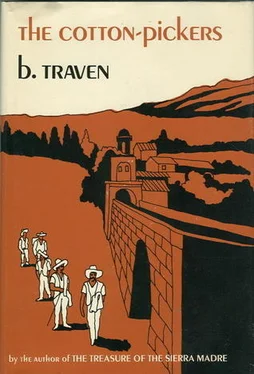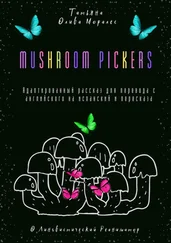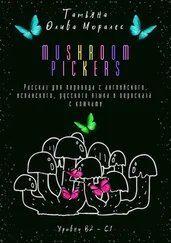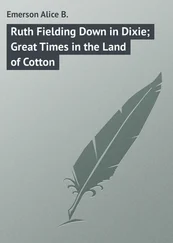B. Traven - The Cotton-Pickers
Здесь есть возможность читать онлайн «B. Traven - The Cotton-Pickers» весь текст электронной книги совершенно бесплатно (целиком полную версию без сокращений). В некоторых случаях можно слушать аудио, скачать через торрент в формате fb2 и присутствует краткое содержание. Год выпуска: 1969, Издательство: Hill and Wang, Жанр: Проза, на английском языке. Описание произведения, (предисловие) а так же отзывы посетителей доступны на портале библиотеки ЛибКат.
- Название:The Cotton-Pickers
- Автор:
- Издательство:Hill and Wang
- Жанр:
- Год:1969
- ISBN:нет данных
- Рейтинг книги:3 / 5. Голосов: 1
-
Избранное:Добавить в избранное
- Отзывы:
-
Ваша оценка:
- 60
- 1
- 2
- 3
- 4
- 5
The Cotton-Pickers: краткое содержание, описание и аннотация
Предлагаем к чтению аннотацию, описание, краткое содержание или предисловие (зависит от того, что написал сам автор книги «The Cotton-Pickers»). Если вы не нашли необходимую информацию о книге — напишите в комментариях, мы постараемся отыскать её.
—Book World
The Cotton-Pickers — читать онлайн бесплатно полную книгу (весь текст) целиком
Ниже представлен текст книги, разбитый по страницам. Система сохранения места последней прочитанной страницы, позволяет с удобством читать онлайн бесплатно книгу «The Cotton-Pickers», без необходимости каждый раз заново искать на чём Вы остановились. Поставьте закладку, и сможете в любой момент перейти на страницу, на которой закончили чтение.
Интервал:
Закладка:
Doux and the other businessmen in town knew how to keep us too busy at work to learn to think for ourselves. It was a new country, as far as business ventures went. Everybody had but one thought and that was to get rich, and to get rich quick, without regard to what happened to the other fellow. That was the way of the oil people, the mining people, the merchants, hotel proprietors, plantation owners — in fact of anyone who had a few pesos. They must all exploit something or someone. If they couldn’t exploit an oil field or a silver mine, or customers or hotel guests, they would exploit the hunger of the down-and-outers. Everyone must bring in money, and everything did bring in money. There was gold in the veins and muscles of the hungry workers as surely as there was gold in the gold mines. To exploit a gold mine a great deal of capital was needed and risked. To exploit an oil field might mean drilling ten times to a depth of two thousand five hundred feet, at great expense, to get nothing but dry holes in the end. But as long as any worker could move his limbs he was no dry hole; he was more conveniently exploited than any gold mine or oil field.
Take Apfel, a Hungarian. He arrived in Mexico with a few hundred pesos in his pocket but couldn’t find work. So he rented a small shack and bought tools from one junk dealer and some old sheet iron from another; out of this junk he made buckets and water tanks.
One day a man came and said: “Could you make me a tank?”
“Sure, if you give me an advance of one hundred pesos,” said Apfel.
But he couldn’t make this tank single-handed.
In a Chinese eating joint he ran into a compatriot from Budapest, begging and in rags. The man had come into the joint, gone up to Apfel’s table, and asked in broken Spanish if he might have the half of a roll which was lying there unwanted.
“Take it,” said Apfel. “Aren’t you Hungarian?”
“Yes, I’m from Budapest.”
So they conversed in Hungarian.
“Are you looking for work?” Apfel asked.
“Yes, I’ve been looking for work for a long while, but there’s nothing.”
“No, there’s not much of anything,” Apfel agreed, “but I can get you work.”
“Really? I’d be so grateful if you could.”
“But it means a fourteen-hour stretch.”
“That’s all right, as long as it’s work and pays money for food.”
“The pay’s not so good either. Only about two pesos and fifty centavos.”
“I’d be satisfied with that.”
“Then come tomorrow morning,” said Apfel, and he explained how to find his work shack. “I work there, too; I’ve got a small contract.”
“I’m glad to be working with a fellow countryman.”
“You may well be,” said Apfel, “for who else would take you on? There’s absolutely no work to be had.”
The man started to work for Apfel, and he worked with a will. Fourteen hours a day. In a tropical country. In a wooden shack under a corrugated iron roof. Two pesos fifty a day. Fifty centavos a night for a bed — no, not quite a bed, but a wooden frame with a piece of canvas stretched across it. In a flophouse, where bugs and mosquitoes made each night a hell. Fifty centavos for a noon comida at the Chink’s, and fifty more for a supper there. Twenty centavos for a cup of breakfast coffee and ten centavos for two dry rolls. A few cigarettes a day. A glass of ice water for five centavos — perhaps two or three glasses during the long day. Then his shirt fell to pieces, his shoes already having gone west before he began to work for Apfel. New shoes consumed a full week’s work, a shirt two days’ work, always assuming that he bought nothing to eat. This went on for two weeks, three weeks, four weeks. Then he was taken to the local poorhouse — malaria, fever, God knows what. Two days later he was crammed into a pine box and shoved into the ground.
But Apfel fulfilled his contract for the tank and got an order for three more of the same. He could always find more starving immigrants, if not Hungarians, then Austrians, or Germans, or Poles, or Czechs. The port was swarming with them; and they were all so grateful to Apfel for giving them work. Now it was only a twelve-hour day; he moved ahead with the times and didn’t want to exploit the unemployed. But it was still two-fifty a day, with three-fifty for the foreman whom he now needed. It was going on four years since he had made his first tank; and he was driving his own car and had built a house for himself in the North American Quarter. Yes, even the bones of a compatriot to whom you extended a helping hand and who, because of this help, because of overwork, because of the rat hole in which he slept, because of the lack of proper nourishment died of fever and was buried in a pauper’s grave — even this could be turned into gold.
The Budapest newspapers reported that citizen Apfel had, “by his industry and enterprise made a sizable fortune in a few years.” Fortunes were made overnight that way. All you had to do was to exploit the various kinds of gold mines.
And the foreigners could do it more handily than anyone else, for if natives and noncompatriots made trouble for them, they claimed the protection of their embassy; and then freedom-loving America would threaten military intervention.
15
The dormitory for the bakery help was a huge wooden box with a tin roof — you couldn’t have called it a house. Daylight entered through window openings which were innocent of either glass or screen. Six wooden steps led up to the door; the space underneath them was crammed with old egg crates, empty cans, old rope, and rotten rags, and there were packs of rats running wild among the junk. During the rainy season this became a swamp hole and an ideal breeding ground for hundreds of thousands of mosquitoes.
The dormitory room, just big enough to permit passage between the contraptions that we called our beds, served not only as our home but also as the home of great lizards, huge cockroaches, and spiders. There were also three dogs wandering about our place; one of them had mange and was horrible to look at. When he got better, the others got it. But the dogs were very fond of us and we didn’t chase them away; they were our only solace on those days when we had no time or strength to take a walk in the streets or the park and fell into our canvas cots, too worn out to sleep.
Occasionally Antonio or I would sweep the room. It was never scrubbed, but, as the roof leaked, we got plenty of water inside whenever there was a tropical downpour, which during the last weeks of the rainy season happened every half hour. We got bathed in bed, too, and our night’s rest was a game of getting up during rainstorms, again and again, to push our beds under some section of the roof where we imagined no rain would trickle through.
Each of us had a mosquito net, or bar, as they are called. But they were full of holes, and the mosquitoes not only found the tears with the greatest of ease but also came through those places which we imagined were free of holes. We sewed up the nets as best we could, but on the following day a rip would start from the old hole. You could say that each net consisted of a number of large holes held together by shreds of rotten fabric.
In addition to this net we each had a tattered blanket and a dirty pillow. On the wall our predecessors had left us an old mirror in a tin frame, a few photos of nude girls, and some
other photographs of the kind which, in many countries, would come within the province of the public prosecutor. No fine arts commission, however progressive, could possibly have defended these photographs, for they had absolutely nothing to do with art and had everything to do with nature’s processes. But in a country where a boy of ten can buy them as easily as a gray-haired sailor, they are of no special interest; it’s always only the forbidden fruit that tempts. So we saw nothing special about the photos. We didn’t have time to bother about them.
Читать дальшеИнтервал:
Закладка:
Похожие книги на «The Cotton-Pickers»
Представляем Вашему вниманию похожие книги на «The Cotton-Pickers» списком для выбора. Мы отобрали схожую по названию и смыслу литературу в надежде предоставить читателям больше вариантов отыскать новые, интересные, ещё непрочитанные произведения.
Обсуждение, отзывы о книге «The Cotton-Pickers» и просто собственные мнения читателей. Оставьте ваши комментарии, напишите, что Вы думаете о произведении, его смысле или главных героях. Укажите что конкретно понравилось, а что нет, и почему Вы так считаете.











